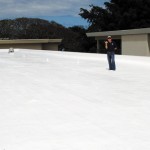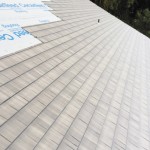According to the National Roofing Contractors Association (NRCA), “Roof systems and materials generally are divided into generic classifications: low slope and steep slope.” Dividing roofing into these two categories assists homeowners in finding the most appropriate roofing material for their home.
Start by determining the pitch of your roof, something a certified roofing estimator will do right away.
The pitch of your roof is defined by the rise-over-run factor. This is the number of feet your roof increases in elevation per 12 feet. For example, a 2:12 pitch means your roof changes elevation by 2 feet for every 12 feet of roofing.
Low slope is classified as a roofing membrane with a slope less than or equal to 3:12. This category also includes flat roofing systems, which have little to no pitch. These are most identified as roofs that are nearly horizontal, but have enough slope so that water can drain off (typically 1:12 pitch or lower).
Here are some ideal roofing materials for low-slope roofs: Built-up roofing is the traditional hot-tar-and-gravel roofing system.
Modified Bitumen, also known as Brai, is comprised of rubber and elastomers, which also are arguably stronger than tar. Also, there is TPO, which is a single-ply, rolled roofing system; the product consists of large sheets of plastic or rubber compounds that are mechanically fastened or fully adhered to the roofing deck. The seams of the TPO product overlap and are then welded together by heat, forming a monolithic — or seamless — roof. This is the new roof of choice for contractors, and it offers great warranty and excellent reflectivity. Another viable option to utilize for low-slope roofing is specific types of mechanically fastened, metal roofing systems. These can be installed on slopes as low as 1:12.
Surface Shield Roofing Co. prides itself on being a certified installer for numerous material manufacturers, including but not limited to, Carlisle and CertainTeed, well-known manufacturers of low-slope roofing products. Being a certified installer allows Surface Shield Roofing Co. to offer valuable warranty options to homeowners with low-slope roofing systems. These warranties range from 10 years to 25 years, depending on material choice and installation.
If you already have a low-slope system in place, but want to cool down the area or enhance the longevity of the roof, the company recommends utilizing any choice of its silicone or elastomeric coating systems. These will create a watertight roofing membrane and assist homeowners that have ponding water issues that may be degrading the integrity of their current roofing system. Surface Shield Roofing Co. is a platinum-certified installer for Tropical Silicone and a certified installer for Gaco. This allows the company to provide iron-clad warranties on coating systems, ranging from 15 years to a lifetime.
The NRCA defines steep-slope roofing as roofing structures that exceed 3:12. Five of the most popular roofing systems that can be installed on steep-sloped roofing structures are asphalt shingles, clay tile, concrete tile, metal shake or wood shake. Each of these roofing systems is equipped with material warranties ranging from 20 years to limited lifetime coverage. The company offers the CertainTeed Select ShingleMaster program and therefore is able to provide homeowners with quality asphalt shingle installation that can provide three to five-star warranties.
Surface Shield Roofing Co. is a full-service roofing business, offering Hawaii’s homeowners multiple roofing installation options and some of the best warranties in the industry.
For a free estimate, call Surface Shield Roofing Co. at 739-9599 or visit the web-site at surfaceshieldroofing.com.
SURFACE SHIELD ROOFING CO.
contact // 739-9599
email // info@surfaceshieldroofing.com
web // surfaceshieldroofing.com
See more articles from: Surface Shield Roofing Company

